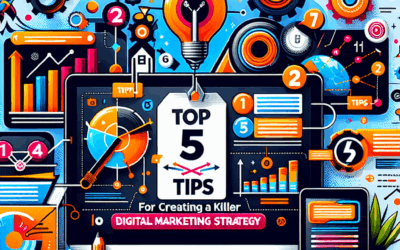In today’s ever-evolving e-commerce landscape, businesses face the mounting challenge of standing out in a crowded digital marketplace. Traditional marketing strategies, while still valuable, often fall short when it comes to engaging modern consumers who expect personalized experiences. The key to unlocking increased sales lies in harnessing the power of personalization through targeted marketing. This article will explore how effective personalization can elevate e-commerce sales by creating deeper connections with customers, enhancing user experiences, and leveraging data-driven insights.
Understanding the Importance of Personalization in E-Commerce
Personalization refers to the customization of marketing messages and user experiences based on individual preferences, behaviors, and interests. In the context of e-commerce, this can involve recommending products, sending tailored email campaigns, or personalizing the shopping experience on websites and apps. The significance of personalization stems from the following:
- Customer Expectations: In an age where streaming services and social media algorithms curate content to individual tastes, consumers have come to expect similarly tailored shopping experiences.
- Increased Competition: As more brands enter the e-commerce space, personalization has become a vital differentiator, helping businesses to build lasting customer relationships.
- Data Availability: With the vast amount of data available from customer interactions, businesses can now segment audiences and create hyper-targeted marketing strategies.
Benefits of Targeted Marketing through Personalization
Effectively implemented, targeted marketing through personalization offers numerous advantages for e-commerce businesses:
1. Enhanced Customer Experience
Personalization creates a unique shopping experience for every consumer. By leveraging data analytics, brands can tailor product recommendations and content, making it easier for customers to find what they are interested in. This not only improves customer satisfaction but also reduces decision fatigue, resulting in more completed purchases.
2. Improved Conversion Rates
When e-commerce platforms deliver personalized content, they see higher conversion rates. A study by Epsilon indicates that personalized emails and recommendations lead to over a 30% increase in engagement. With targeted marketing, customers are more likely to follow through with purchases, reducing cart abandonment rates.
3. Higher Customer Retention
Personalization fosters loyalty. Customers who feel valued and understood are more likely to return to a brand for future purchases. By continually interacting with consumers through tailored communication, brands can cultivate long-term relationships that drive repeat sales.
4. Strategic Upselling and Cross-Selling
By analyzing customer purchase histories and behaviors, businesses can effectively upsell complementary products. For instance, recommending a matching accessory when a customer buys shoes not only enhances the shopping experience but significantly increases average order value.
Implementing Personalization Strategies in E-Commerce
To harness the full potential of personalization, e-commerce businesses must implement effective strategies. Here are several actionable steps:
1. Gather and Analyze Customer Data
The first step in personalization is collecting relevant data. This might include behavior tracking, purchase history, demographics, and preferences. Businesses can use tools like website analytics and customer relationship management (CRM) software to gather insightful data to inform their marketing strategies.
2. Segment Your Audience
Not all customers are the same. By segmenting audiences based on behaviors, interests, and preferences, brands can create targeted campaigns tailored to specific groups. For example, a clothing retailer may create separate marketing strategies for casual shoppers, trendsetters, and value-focused customers.
3. Use Intelligent Automation Tools
Automation tools can help deliver personalized experiences at scale. Email marketing platforms and CRM systems offer features such as behavioral triggers and recommendation engines, which can automatically send personalized messages based on customer actions.
4. Create Customized Content
Custom content is critical in engaging customers. Personalized blog posts, videos, or newsletters can address specific interests, driving traffic back to the site and encouraging interactions.
Case Studies of Successful Personalization in E-Commerce
1. Amazon
Amazon is a pioneer in e-commerce personalization, utilizing sophisticated algorithms to recommend products based on past purchases, browsing behavior, and even what other customers have bought. This not only increases the likelihood of sales but challenges competitors to adopt similar strategies to attract consumers.
2. Netflix
While not strictly e-commerce, Netflix has mastered personalization by analyzing viewer habits to suggest movies and TV shows based on individual preferences. Their success underscores the impact personalization has on customer retention and increased usage—lessons that e-commerce platforms can replicate.
Challenges to Consider with Personalization
While the benefits of personalization are clear, businesses must navigate challenges, including:
- Data Privacy: With increasing regulations on data collection, brands must prioritize transparency and ensure compliance with privacy laws.
- Complex Implementation: Personalization requires significant resources, technology, and expertise—factors that smaller businesses may find overwhelming.
- Over-Personalization: Brands must avoid coming off as intrusive by carefully balancing personalization with respect for consumer privacy.
Conclusion
The power of personalization in e-commerce cannot be overstated. By investing in targeted marketing strategies that resonate with individual consumers, brands can significantly enhance customer experiences, improve conversion rates, and foster loyalty. As the digital marketplace continues to grow and evolve, businesses that prioritize personalization will find themselves not only surviving but thriving in an increasingly competitive environment. Embracing this powerful tool is not merely an option—it’s a necessity for any brand aiming to succeed in the e-commerce arena.
At USA Marketing Pros, we specialize in elevating your online presence with expert web design, SEO, and digital marketing solutions. Based in Arlington, VA, we proudly serve businesses across Northern Virginia and the greater Washington, DC area. Get in touch with us today to see how we can help your business grow at (202) 888-5895 or visit us at 701 12th St S, Arlington, VA 22202.
Need Custom Digital Marketing For Your Business? Check out our Digital Marketing Services
Free Digital Marketing Strategy Call




0 Comments